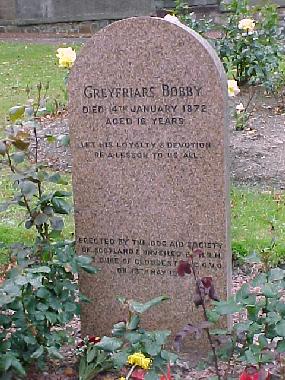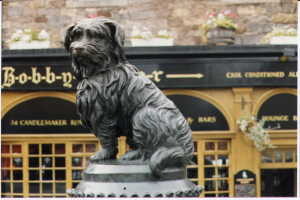A Canine Example for Each of Us
|
Edinburgh, Scotland is an ancient and most remarkable city. The first thing that one notices about the city is what the Scots call the "Mound." The Mound is an ancient out cropping of a dormant volcano. Perched upon the top of the eroded volcano stands Edinburgh Castle. Holyrood Palace marks the base of the western slope of the volcano. The Scots built a beautiful road between the castle and the palace and called it the Royal Mile since it is about that distance between the two edifices. On either side of the Royal Mile, one can discover the unique and most remarkable history of what makes Edinburgh a treasure of the past and present. One can't miss St. Giles Cathedral, John Knox's home, and my favorite tourist spot: John Campbell's, the butcher. The meat market is a favorite of the wealthy residents and wide-eyed tourists from America. One can watch local dogs come in off the street and lick the blood dripping from the carcasses of the newly butchered sheep waiting to be sold. Just off the Royal Mile is a side street where Greyfriar's Church is located. Next to the church is a two hundred year old Greyfriar's Tavern that derives its name from the kirk next door. Many a person and his companion have come there over those many years to eat and drink at this Edinburgh landmark. John and Bobby came there every day for lunch. There they would eat a modest meal and drink together. At their leisurely lunch, these old friends would share their feelings about the day. This routine continued for many years. Finally, John, whose last name happened to be Grey, died and was buried in the cemetery at Greyfriar's Church right next to the tavern where he and Bobby would take their lunch. Many missed John Grey but none suffered more than Bobby did. He was there to watch John's coffin being lowered into the grave. I wonder what thoughts he had as he looked longingly into that hole that would now be John's resting place. Bobby remained there long after all the other mourners left the services at the grave. Many mourners, knowing of his closeness to John, invited Bobby to come along with them for dinner, but Bobby merely stood there without responding, his head bowed in sorrow. No one really knows when Bobby finally left John's grave that night, but the next day at noon, Bobby returned to the tavern and had his regular meal-without his old friend. The food surely must have gone down with great difficulty due to his deep grief and loss. Then off he went to visit the grave of his friend. For the remainder of that day, Bobby simply stood silently there at the grave in his tribute to John. This scene was repeated every day for the next fourteen years! Then finally on one cold January morning in 1872, Bobby was found dead at his friend's grave. He seemed content, even at peace. At least, that's what the sexton of the church said after finding Bobby. Think about all those hours of hurt, all those days of devotion, and all those years of longing love. The startling thing about this true story is that a Skye Terrier conducted the fourteen-year vigil. Bobby was just an ordinary dog who truly loved his master. In a fitting gesture, the people of Edinburgh buried Bobby next to John at Greyfriar's Cemetery. Finally, Bobby was with his friend forever. Why was Bobby, that Skye Terrier, so vigilant at John's grave? The answer is simple. Bobby experienced love from John and in response to that love; Bobby expressed his love in the only way he knew-by standing silently at the grave for all those years. There is a lesson for us about love in this remarkable story from Edinburgh. I'm not suggesting that when a loved one dies we should stand at the grave until we too die. Bobby was just a dog; he had no other means by which to express his love, loss, and devotion to John. However, Bobby's fourteen long years can be illustrative of the kind and not necessarily the manner of our response. When we experience love, we need to return that love to the giver and to others around us. A Skye Terrier shouldn't be able to outdo our ability to love another.
|








